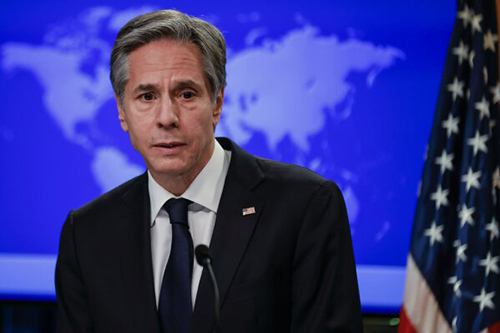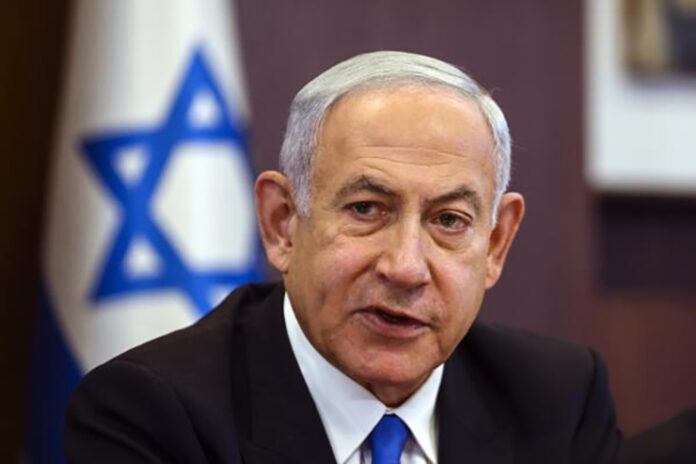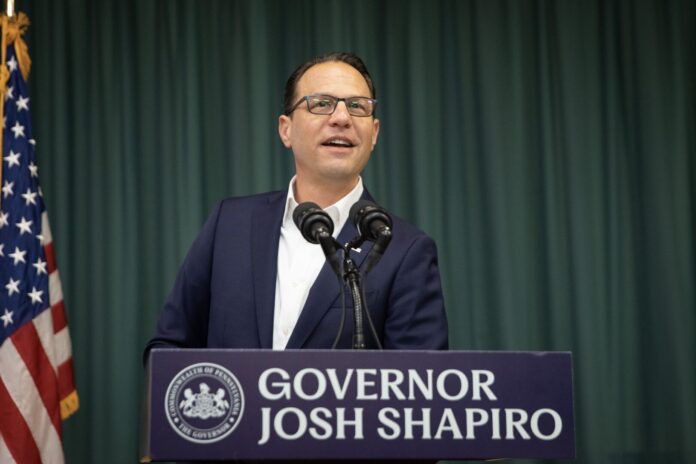Edited by: Fern Sidman
In the wake of Columbia University’s decision to cancel its main commencement ceremony following prolonged pro-Hamas protests, Pennsylvania Governor Josh Shapiro, a key Democratic figure, has been vocal about his concerns regarding the role of universities in current political and social debates, according to report in the New York Times. As protests and contentious debates over Israel’s military actions and broader foreign policy issues ripple through academic settings, Shapiro’s comments reflect broader tensions within the Democratic Party and the complex interplay of domestic politics and international relations.
Governor Shapiro, speaking from his office in Harrisburg shortly after the cancellation at Columbia University, expressed a pointed critique of higher education institutions. As was reported in the NYT, he lamented what the colossal failure on the part of colleges to provide essential information that fosters well-rounded perspectives among students. Shapiro argued that universities are inconsistently addressing forms of hate, condemning some while overlooking others, including anti-Semitism. As per the NYT report, this criticism comes at a time when universities are under intense scrutiny over their handling of anti-Israel activism and freedom of speech on campus.
Josh Shapiro, at 50, is not only the governor of a significant battleground state but also a rising star in the Democratic Party known for his devout Jewish faith. His leadership has been marked by a proactive stance on various social issues, including the rise of anti-Semitism, particularly following the Hamas-led attack on Israel on October 7, according to the information provided in the NYT report. Shapiro’s observant Jewish background plays a crucial role in shaping his views and public statements regarding Israel and its policies.
While typically state governors have limited roles in foreign policy, Shapiro has been notably outspoken about international issues, especially those concerning Israel. As explained in the NYT report, his readiness to engage with these topics publicly reflects his broader political philosophy and his willingness to address what he sees as key moral and ethical issues, regardless of the traditional boundaries of state governance.
In response to a recent attack on Israel by Iran, Shapiro took to social media to affirm Pennsylvania’s support for Israel, reinforcing his pro-Israel stance. This public declaration, however, sits within a complicated landscape of intra-party debate among Democrats, where views on Israel’s military actions and its policies towards Palestinians vary widely, the NYT report noted. Some within the party have expressed increasing criticism of Israel, making Shapiro’s open support particularly significant.
Amid rising tensions on university campuses and public venues concerning free speech and anti-Semitism, Shapiro has positioned himself as a staunch defender of moral clarity and decisive action. As per the information contained in the NYT report, his involvement in a series of incidents related to the University of Pennsylvania and other local issues illustrates the challenges and controversies facing public officials in navigating the complex intersections of free expression, hate speech, and public safety.
A significant moment of contention arose when the president of the University of Pennsylvania hesitated during a congressional hearing to define whether advocacy for genocide against Jews violated the university’s policies. This hesitation sparked a wave of criticism, highlighting a perceived lack of leadership and moral clarity. Governor Shapiro was quick to respond, asserting that the president’s inability to directly address the question represented a failure in moral leadership, as was indicated in the NYT report. The fallout from this incident was severe, ultimately leading to the president’s resignation, signaling the high stakes involved in university governance and public accountability.
Governor Shapiro’s commitment to combating anti-Semitism was further demonstrated in his response to a protest outside a popular Israeli-style restaurant in Philadelphia, known for its falafel and tahini shakes. When the demonstration, which critiqued the Gaza war, targeted the restaurant, Shapiro labeled the act as anti-Semitic and made a public show of support by dining there, the report in the NYT said. This action was not just about taking a meal; it was a deliberate statement illustrating his stance against a discriminatory attack against Jews under the guise of political protest.
One of the thorniest issues in contemporary discourse is the delineation between free speech and hate speech, a dilemma that has particularly manifested in academic settings. Governor Shapiro has been vocal about the responsibilities of university officials in this arena, especially following an incident where police cleared a pro-Hamas encampment at the University of Pennsylvania. Shapiro supported the clearance, emphasizing the necessity of maintaining a campus environment free from discrimination and intimidation.
In discussing these issues, Shapiro acknowledged the complexity of the situation, stating that not all protests or encampments are inherently anti-Semitic. However, he highlighted a perceived inconsistency in how anti-Semitic expressions are handled compared to other forms of hate speech, as was detailed in the NYT report. He posed a hypothetical comparison to white supremacist demonstrations, suggesting that there would be a more forceful response if the roles were reversed.
The increase in hate crimes in recent months has alarmed communities and advocacy groups, prompting a necessary response from political leaders. Shapiro, leveraging his platform and background as the former state attorney general, has been unequivocal in his stance against such hatred. His approach to addressing these issues reflects a broader perspective on the responsibilities of leadership in fostering an inclusive society.
“Anti-Semitism, Islamophobia, and all forms of hate should be universally condemned,” Shapiro stated, as was reported in the NYT. His comments not only highlight the need for a decisive stance against bigotry but also suggest that recognizing the nuances in foreign policy discussions does not preclude straightforward condemnation of hate.
Shapiro’s popularity in Pennsylvania is significant, with a recent survey indicating a 64 percent job approval rating. This level of support can be attributed to his bipartisan approach and focus on pragmatic, non-ideological issues that resonate with a broad spectrum of Pennsylvanians. The NYT report indicated that a notable achievement in this vein was his swift action to reopen a critical section of Interstate 95 following a collapse, demonstrating his capacity to respond effectively to immediate state needs.
Speculation about Shapiro’s future in national politics is rampant, with many of his supporters in Pennsylvania hoping to see him become the first Jewish president of the United States. The information in the NYT report affirmed that while he skillfully deflected questions about such aspirations, focusing instead on his current responsibilities and achievements as governor, his actions and popularity clearly position him as a formidable figure on the national stage.
Reflecting on the recognition of his efforts, Shapiro expressed humility and a focused determination to pursue what he sees as his primary duty—serving the people of Pennsylvania and addressing critical national issues. His emphasis on moral clarity and rooting out hate sheds light on his approach to governance, aiming to foster a safer, more inclusive society. This focus aligns with his broader political stance, which includes support for the Biden administration, suggesting a strategic alignment with broader Democratic goals while also addressing immediate state and national concerns.
The recent escalation in the Middle East conflict has reverberated across the United States, sparking protests and raising questions about the boundaries of criticism versus hate speech. On college campuses, where debates are particularly intense, Governor Shapiro has articulated a clear distinction: while criticism of Israeli government policies remains a legitimate aspect of democratic discourse, conflating all Jewish individuals with these policies crosses into the realm of anti-Semitism, the NYT reported. Shapiro’s stance highlights his commitment to distinguishing between fair political criticism and harmful prejudice.
Shapiro’s Jewish identity is not merely a background detail but a central aspect of his public and political persona. His upbringing and education in Jewish institutions have significantly shaped his values and leadership style. As an alumnus of a Jewish day school, he frequently incorporates Jewish cultural references and ethical principles into his public communications, the NYT report explained. This blend of personal heritage and public service is exemplified by his interactions within the community—whether offering matzo ball soup to an ailing local sports figure or incorporating Martin’s Potato Rolls, a regional favorite, into his Passover celebrations.
Shapiro’s personal life, particularly his observance of the Jewish Sabbath, which he prioritizes by ensuring he is home for Friday night dinners, plays a critical role in his public persona and political identity. The NYT report revealed that this commitment to family and faith not only grounds him personally but also allows him to connect with people of other faiths across the state, enhancing his appeal among diverse voter groups.
Notably, he proposed to his wife in Jerusalem, a city that holds profound significance in Jewish history and culture, the NYT report said. This symbolizes his commitment to the idea of a Jewish homeland, which he passionately supports. The NYT report indicated that Shapiro’s affirmation of his Zionist beliefs aligns him with a traditional pro-Israel stance, emphasizing the security and longevity of Israel as a nation-state.
While Shapiro is openly pro-Israel, he also supports a two-state solution to the Israeli-Palestinian conflict, demonstrating his advocacy for a peaceful resolution that respects the aspirations of both peoples. As suggested in the NYT report, this position, though common among many elected Democrats, places him in a delicate balance, especially in light of the highly charged campus protests that often express anti-Zionist sentiments.
Shapiro’s critique of Israeli Prime Minister Benjamin Netanyahu further illustrates his willingness to engage critically with Israeli policies, despite his overall support for the country. As per the information in the NYT report, his nuanced views reflect an attempt to reconcile his deep-seated support for Israel with a broader vision for peace and justice in the region, including mourning the loss of life in Gaza, which shows his empathy towards all affected by the conflict.
Despite his efforts to maintain a balanced approach, Shapiro’s stance has not been without controversy. Following the October 7 events, his comments have drawn criticism from some Muslim and Arab communities within Pennsylvania. The decision by two board members of the Council on American-Islamic Relations (CAIR) in Philadelphia to skip an iftar dinner hosted by him calls attention to the challenges Shapiro faces in his attempts to be an inclusive leader, as was said in the NYT report. These community leaders expressed concerns that Shapiro’s positions had caused harm and hurt among Muslim, Arab, and pro-Palestinian Pennsylvanians, highlighting the difficulty of maintaining communal harmony while supporting complex international issues.
Criticisms from Ahmet Tekelioglu, the executive director of the Philadelphia chapter of the Council on American-Islamic Relations (CAIR), highlight a perceived disconnect between the governor’s actions and the expectations of this community, the NYT reported. Tekelioglu’s remarks suggest that Shapiro’s decisions, particularly his endorsement of disbanding a pro-Hamas encampment at the University of Pennsylvania, have eroded trust among many who previously viewed him as a supportive figure.
In response to these criticisms, Governor Shapiro emphasized his commitment to maintaining strong ties with all communities, including the Muslim population in Pennsylvania. He asserted that his administration has worked to create welcoming spaces for all faiths, both at his residence and across the state, as was noted in the NYT report. Shapiro’s remarks reflect his intention not to allow disagreements with individual organizations or statements to overshadow his broader efforts to engage with diverse communities.
State Representative Tarik Khan, a Philadelphia-area Democrat and a Muslim, provides a contrasting perspective. By attending the iftar, which included time for prayer and a substantial dinner, Khan highlighted Shapiro’s efforts to genuinely engage with the community. The report in the NYT pointed out that his participation and positive remarks about the event suggest that, despite the criticisms, there are still elements within the Muslim community who appreciate and recognize Shapiro’s attempts to connect and address their concerns.
Governor Shapiro also faces pressures from the Jewish community, particularly given his vocal support for Israel and his stance on anti-Semitism. These pressures illustrate the tightrope that Shapiro must walk, balancing his personal convictions and political responsibilities with the need to be an inclusive leader for all Pennsylvanians.
Many within the local Jewish community feel a personal connection to Shapiro, viewing him as a representative of their own cultural and religious aspirations. The NYT report said that Jonathan Scott Goldman, the chair of the Pennsylvania Jewish Coalition, articulated this sentiment by noting that while many Jewish Pennsylvanians “claim Josh as their own,” it is crucial to remember that Shapiro’s responsibilities extend beyond any single group.
Governor Shapiro is acutely aware of the diverse expectations placed upon him. While he is recognized for his Jewish identity, he emphasizes his role as the governor for all Pennsylvanians, regardless of their religious or ethnic background. This stance is not just a political necessity but a deliberate approach to governance that seeks to be inclusive and representative of all constituencies within the state.
In a broader reflection on American politics and societal bias, Shapiro expresses a confident outlook on the nation’s capacity to rise above prejudice. When asked about the possibility of a Jewish president within his lifetime, Shapiro’s response is affirmative, illustrating his belief in the country’s ability to elect leaders who may look or worship differently than the majority, the NYT report indicated. His perspective highlights a hopeful vision for the future, suggesting that while bias exists, the overarching trend could lean towards greater inclusivity and acceptance in political leadership.
Shapiro’s commentary on the potential for a Jewish president is reflective of broader societal questions about representation and bias in American leadership. His optimism is tempered with a realistic acknowledgement of the existing prejudices, providing a nuanced view of the challenges and possibilities within the American electoral landscape. This balance between acknowledging biases and championing the potential for overcoming them illustrates Shapiro’s pragmatic approach to both his governance and his public communications.
























